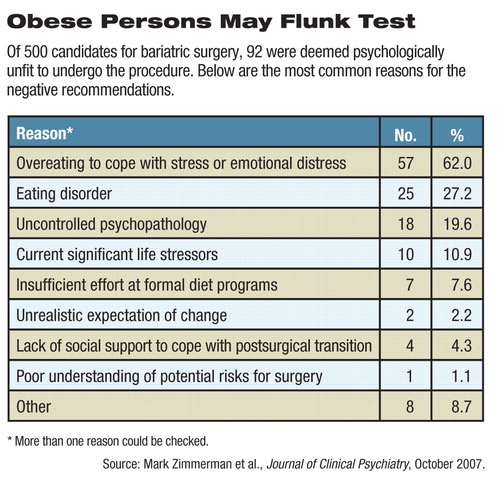Psychological Problems Disqualify Many Bariatric Surgery Candidates
Not surprisingly, as America's girth widens, more and more Americans are seeking bariatric surgery to fix the problem. Bariatric surgery is generally considered the most effective treatment for people who are extremely overweight.
However, a substantial number of them may not be psychologically fit enough to have the procedure, a new study suggests.
The study, which appeared in the October Journal of Clinical Psychiatry, was headed by Mark Zimmerman, M.D., an associate professor of psychiatry at Brown University.
Five hundred candidates for bariatric surgery—representative of patients seeking that form of surgery in Rhode Island—were evaluated from 2004 to 2006 to determine whether they were psychologically fit enough to undergo the procedure. They were assessed with DSM-IV-based semi-structured interviews, with supplemental questions about their eating and dieting histories, reasons for wanting the surgery, understanding of the risks involved, and recent stresses experienced.

Ninety-two of the subjects (18 percent) were determined to be not psychologically fit enough to undergo the procedure, Zimmerman and his colleagues found. The major reasons for their exclusion were that they were overeating to cope with stress or emotional distress, engaging in binging or had another eating disorder, or had uncontrolled psychopathology (see table).
“We have perhaps been most surprised by patients' honesty in revealing emotional problems that they might not have revealed,” Zimmerman told Psychiatric News. “I think this is because we explain to them that our goal is not to prevent them from having surgery. Rather, we seek to identify problems that might interfere with the success of surgery, address these, and thereby increase the likelihood of a positive outcome from surgery.”
Almost all the patients who were not cleared for surgery in the study were referred for psychiatric treatment. Those patients who were not cleared because of overeating in response to stress were referred to a psychologist to learn alternative methods of coping with emotional distress. Zimmerman and his colleagues will now determine how many of the individuals who were referred for psychiatric treatment actually accepted it.
Another important result to emerge from the study was that the decision of whether to approve candidates for bariatric surgery can be made with high reliability—something that previous studies had not examined. Specifically, each patient in the study was first assessed by a mental health professional, who prepared a comprehensive report and then gave it to a psychiatrist to review. The psychiatrist then reviewed the report with the patient and made the final determination of whether the patient should have surgery. Then, after a final decision had been reached for all 500 patients, a psychiatrist who had not evaluated any of the patients reviewed the decisions in 73 cases and agreed with nearly all of them.
“It was therefore reassuring that we found a high reliability of decision making, thereby indicating that, at least within the same clinical setting, clinicians can independently agree on who should or should not be cleared for surgery,” Zimmerman and his team concluded. “It would be of interest to determine the level of reliability among clinicians working at different bariatric-surgery programs.”
Most bariatric-surgery programs use psychiatrists or mental health professionals to screen potential candidates, Zimmerman said.
“Presurgical Psychiatric Evaluations of Candidates for Bariatric Surgery, Part 1: Reliability and Reasons for and Frequency of Exclusion” can be accessed at<www.psychiatrist.com>.▪



